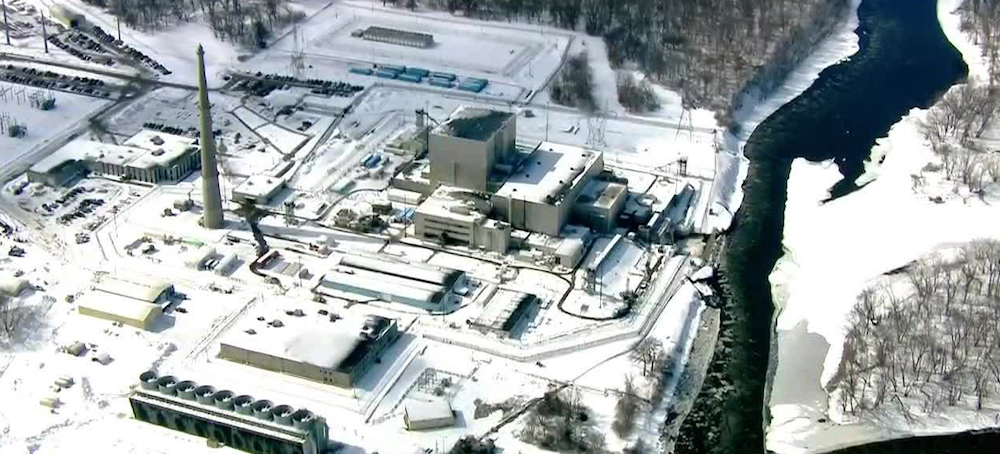A Nuclear Plant That Leaked 400,000 Gallons of Radioactive Water Will Be Shut Down After Second Incident
Erik Ortiz NBC News The Xcel Energy plant in Monticello, Minnesota. (photo: KSTP)
The Xcel Energy plant in Monticello, Minnesota. (photo: KSTP)
Repairs are set to begin to fix the leaking of radioactive water from the facility this week, after a larger leak was discovered in November but only made public this month.
While Xcel Energy said in a news release Thursday that there is "no risk to the public or the environment" with the latest incident at the Monticello Nuclear Generating Plant, the city said it would test the municipal water supply out of precaution.
"The safety of Monticello's residents has been and continues to be our number one priority," Mayor Lloyd Hilgart said in a statement Friday. "We are glad Xcel Energy was closely monitoring the situation and decided to shut down the plant to make permanent repairs immediately to address the recurring issue of water containing tritium leaking from" the plant.
The company added that the leak of water containing tritium, a mildly radioactive form of hydrogen, is "fully contained on-site and has not been detected beyond the facility or in any local drinking water." This second leak involved hundreds of gallons of radioactive water, according to the utility company, far less than the 400,000 gallons in the leak discovered in late November.
But some Monticello residents surrounding the plant — located 38 miles northwest of Minneapolis and upstream of the Mississippi River — say they have concerns about what a recurring leak presents and the delay in finding out about the initial spill.
"I think the general public needs to be informed more about this," said Megan Sanborn, 31, who lives 6 miles upstream from the nuclear plant.
"My children go to school 2 miles downstream from the power plant," she added. "If the water levels were safe the entire time like they were saying, then where was the transparency?"
Xcel Energy notified the federal Nuclear Regulatory Commission and the state on Nov. 22, on the same day it confirmed the leak, as a "non-emergency report" with "no impact on the health and safety of the public or plant personnel." It said the origin of the leak was found about a month later from a broken pipe between two buildings, and that a temporary solution was devised to contain the water and reroute it back to the plant for reuse.
In late February, the city was informed about the leak. But it wasn't until March 16 when state officials told the public and Xcel Energy announced it had been taking steps to contain and manage the leak over the past four months.
"After the company told the state, it was a hush-hush situation," Sanborn said. "No one from the state let residents know we had a nuclear leak, and when we don't have the ability to overcome a potential impact because no one told us, that's a big concern for residents."
Xcel Energy said it has been monitoring to ensure the underground plume of tritium remains within the property and doesn’t contaminate local drinking water or the nearby Mississippi River, which every winter draws hundreds of trumpeter swans lured by the warm water discharged by the nuclear plant.
Tritium is naturally occurring in the environment but is also a result of the production of electricity at nuclear power plants, according to the U.S. Nuclear Regulatory Commission, which says it is "one of the least dangerous radionuclides because it emits very weak radiation and leaves the body relatively quick."
In addition, it says "tritium radiation does not travel very far in air and cannot penetrate the skin."
Tritium spills do happen occasionally but are typically contained within a nuclear site, according to the Nuclear Regulatory Commission.
State officials said they waited to inform the public because they wanted to understand the full scope of the leak and Xcel Energy had not immediately identified the source.
In a previous statement, Xcel Energy said it also understands the "importance of quickly informing the communities we serve if a situation poses an immediate threat to health and safety," but that "in this case, there was no such threat."
The Minnesota Pollution Control Agency, which monitors environmental quality, said Thursday it is "encouraged" that Xcel Energy is taking immediate steps to repair the new leak and that it will continue to monitor groundwater samples for tritium.
"Should an imminent risk arise, we will inform the public promptly," the agency said in a statement, adding that the Nuclear Regulatory Commission, which has regulatory oversight of the plant's operations, should "share ongoing public communications on the leak and on mitigation efforts to help residents best understand the situation."
Xcel Energy said it doesn’t expect its customers’ electric service to be affected. Initially, the company said it had planned to permanently repair the broken pipe during a regularly scheduled refueling outage in mid-April, but the new leakage prompted it to move up the plan.
The incident comes as Xcel Energy is in the midst of seeking an operating license renewal for Monticello. The license is set to expire in September 2030.
At a town hall meeting over the license Wednesday, before the latest leak was known publicly, Nuclear Regulatory Commission officials sought to allay residents' fears.
"There is no reason to have concern for their safety over this," said Valerie Myers, a commission physicist and inspector, according to NBC affiliate KARE in Minneapolis.
"If we tried to do public notifications on everything nuclear because everything seems scary right for nuclear, we would be just bombarding everybody," she added.



